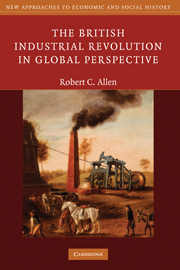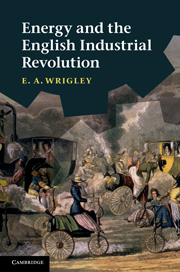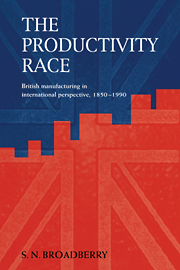The British Industrial Revolution in Global Perspective
Part of New Approaches to Economic and Social History
- Author: Robert C. Allen, University of Oxford
- Date Published: April 2009
- availability: Available
- format: Hardback
- isbn: 9780521868273
Hardback
Other available formats:
eBook
Looking for an inspection copy?
This title is not currently available for inspection. However, if you are interested in the title for your course we can consider offering an inspection copy. To register your interest please contact [email protected] providing details of the course you are teaching.
-
Why did the industrial revolution take place in eighteenth-century Britain and not elsewhere in Europe or Asia? In this convincing new account Robert Allen argues that the British industrial revolution was a successful response to the global economy of the seventeenth and eighteenth centuries. He shows that in Britain wages were high and capital and energy cheap in comparison to other countries in Europe and Asia. As a result, the breakthrough technologies of the industrial revolution - the steam engine, the cotton mill, and the substitution of coal for wood in metal production - were uniquely profitable to invent and use in Britain. The high wage economy of pre-industrial Britain also fostered industrial development since more people could afford schooling and apprenticeships. It was only when British engineers made these new technologies more cost-effective during the nineteenth century that the industrial revolution would spread around the world.
Read more- A major new global economic history of the British industrial revolution
- Combines economic, social, technological and business history
- By one of the UK's leading economic historians
Awards
- Economist Book of the Year 2009
Reviews & endorsements
'Robert Allen has for decades been one of the broadest-ranging and most imaginative scholars in economic history. In this highly original and superbly-researched book, he has set new standards for the study of one of the most critical episodes of human history, the British Industrial Revolution. A must-read for scholars ranging from eighteenth-century history to the economics of modern growth.' Joel Mokyr, author of The Gifts of Athena and The Enlightened Economy
See more reviews'This important book should be required reading for anyone seeking to understand the origins of the industrial revolution. It puts technological change centre stage and places success in invention firmly in the context of economic incentives and business realities that made 18th-century Britain different. This is a stellar demonstration of how subtle economic analysis informed by detailed historical knowledge can provide a persuasive new interpretation of a defining moment in world economic history.' Nicholas Crafts, Professor of Economic History, University of Warwick
'Bob Allen has written, in his usual transparent style, a brilliant book on two of the main questions of economics (or economic history): why did the Industrial Revolution happen in Great Britain, and why did it cause a fundamental break in long term economic development. He argues convincingly that relative prices - high nominal and real wages, and low energy costs - were fundamental in inducing British entrepreneurs and inventors to search for technological solutions that would be labour saving and energy (and capital) using, and that the same relative prices explain why this search process was successful on the British Isles, and much less so on the European Continent. He also demonstrates that, once this process of creative destruction was set in motion, the efficiency of the technologies increased so sharply, that they became highly competitive in different environments - and therefore, after 1820, began to revolutionize the world economy. One of the main strengths of the book is the intimate knowledge the author has acquired of both the technological processes involved, and the economics of industrialization - it is based on a perfect marriage between technological insights and economic analysis.' Jan Luiten van Zanden, author of The Long Road to the Industrial Revolution
'Robert Allen's analysis will delight many economists, for he deals in measurable factors such as wages and prices … This is a beautifully written book, the language as clear as a brook and with the same tumbling energy.' The Economist
'… the smartest thing I have read in at least a year.' Professor J. Bradford DeLong, Department of Economics, University of California, Berkeley
'Robert C. Allen's The British Industrial Revolution in Global Perspective shows that it is still possible to say something new and important on this most crowded of topics, and to do so with lucidity.' Linda Colley, The Times Literary Supplement
'… stunningly good study of the Industrial Revolution … The book is well written and is essential reading for anyone wanting to understand the origins of industrial change in the eighteenth century.' Historical Association
'This is the book you should use to teach the Industrial Revolution.' Journal of Economic History
'The relationship between shari'a and politics is obviously complex. Feldman's book provides an excellent starting point for a subject notoriously difficult and little understood. Feldman gives us a good place to start from, from, for it runs counter to most Western thinking on the subject.' The European Legacy
Customer reviews
Not yet reviewed
Be the first to review
Review was not posted due to profanity
×Product details
- Date Published: April 2009
- format: Hardback
- isbn: 9780521868273
- length: 344 pages
- dimensions: 235 x 158 x 21 mm
- weight: 0.67kg
- contains: 10 b/w illus. 21 tables
- availability: Available
Table of Contents
1. The Industrial Revolution and the pre-industrial economy
Part I:
2. The high wage economy of pre-industrial Britain
3. The agricultural revolution
4. The cheap energy economy
5. Why England succeeded
Part II:
6. Why was the Industrial Revolution British?
7. The steam engine
8. Cotton
9. Coke smelting
10. Inventors, enlightenment, and human capital
11. From industrial revolution to modern economic growth.
Sorry, this resource is locked
Please register or sign in to request access. If you are having problems accessing these resources please email [email protected]
Register Sign in» Proceed
You are now leaving the Cambridge University Press website. Your eBook purchase and download will be completed by our partner www.ebooks.com. Please see the permission section of the www.ebooks.com catalogue page for details of the print & copy limits on our eBooks.
Continue ×Are you sure you want to delete your account?
This cannot be undone.
Thank you for your feedback which will help us improve our service.
If you requested a response, we will make sure to get back to you shortly.
×









